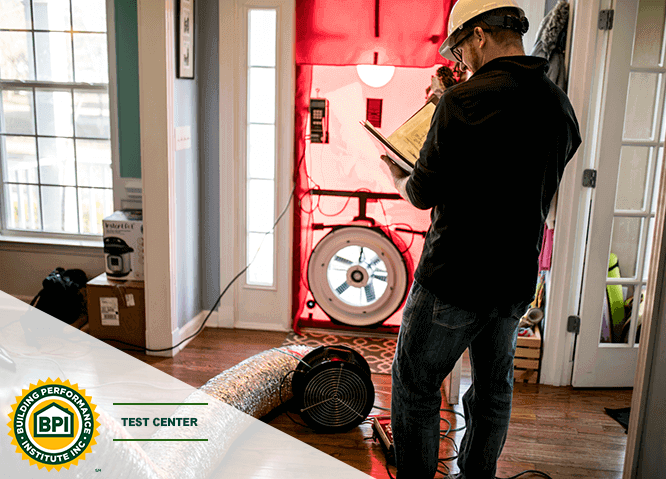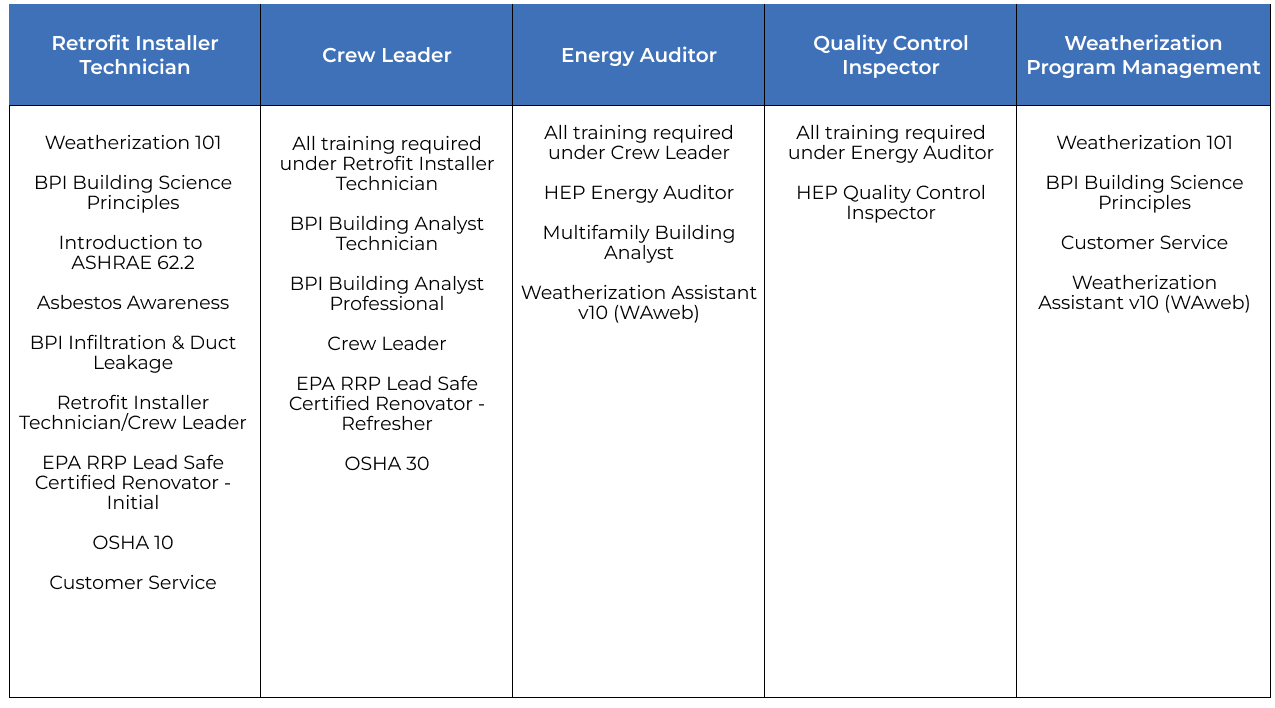No products in the cart.
NC Department of Environmental Quality Presents Weatherization Assistance Training Program
Enhance Your Skills, Amplify Your Impact
Professional development training keeps you on the cutting edge of weatherization best practices, empowering you to deliver even better results for the communities you serve.
The NC Weatherization Assistance Program is constantly evolving, and training ensures that you’re up-to-date with the latest skills, tools, and certifications needed to maximize energy efficiency.
Strengthen your impact with high-quality training. Start today!

Career Pathways

Credentials
Weatherization Training Available to You
Asbestos Awareness
Asbestos Awareness training equips professionals with the knowledge to identify and handle asbestos-containing materials safely, minimizing health risks and ensuring compliance with regulations. This training is crucial for preventing exposure and protecting both workers and building occupants from the serious health hazards associated with asbestos.
This course is approved for 1 BPI CEU.
BPI Building Science Principles
Gain the knowledge you need to be successful as a home performance professional or energy auditor. During this introductory course, you'll learn how the systems in a home work together to affect energy use, thermal comfort, and indoor air quality.
To earn this certificate, you simply have to pass a 100-question multiple choice exam with a score of at least 70%.
This course is approved for 4 BPI CEUs.
BPI Building Analyst Technician
After you’ve passed the BPI Building Science Principles exam, learn to apply the concepts as a Building Analyst Technician. A Building Analyst Technician (BA-T) conducts residential building science-based diagnostic tests and home performance data collection. This includes combustion safety and carbon monoxide testing, blower door testing, and interior/exterior home inspection.
To earn this certification, you must take a 4-hour field exam with an approved BPI Test Center (which Everblue is). You must be proctored, either in person or through online video proctoring. There is no written exam for this credential. This credential has prerequisites.
This course is approved for 7.5 BPI CEUs.
BPI Building Analyst Professional
After you’ve passed the BPI Building Analyst Technician exam, upgrade your skills to become a Building Analyst Professional. A Building Analyst Professional (BA-P) uses energy modeling software to model the energy upgrade potential of a home and to develop a scope of work. BA-P professionals use the data collected from diagnostic tests to determine how a homeowner can improve the energy efficiency of their home, lower their energy bills, and create a healthier/safer space.
To earn this certification, you must pass a proctored written exam. There is no field exam for this credential. This credential has prerequisites.
This course is approved for 2.5 BPI CEUs.
BPI Infiltration & Duct Leakage
This course teaches you how to measure, analyze, and reduce air infiltration and duct leakage using industry-standard BPI testing methods to improve comfort, energy performance, and building durability.
To earn this certification, you must pass a proctored field exam demonstrating your use of the blower door and duct blaster. This credential has NO prerequisites.
This course is approved for 2.13 BPI CEUs.
BPI Multifamily Building Analyst
The BPI Multifamily Building Analyst program is for professionals who work with multifamily buildings to improve their energy efficiency, comfort, and safety. This certification focuses on the unique characteristics and challenges associated with multifamily buildings, such as their varied occupancy, multiple units, and complex systems.
This course is approved for 4 BPI CEUs.
Crew Leader II: Leadership and Conflict Resolutions
This course equips crew leaders with the skills needed to effectively lead field teams and navigate the realities of managing people in fast-paced environments. This course focuses on strengthening communication, improving decision-making, and building confidence in leadership roles. Participants will learn practical strategies for preventing, managing, and resolving conflict while maintaining team productivity and morale. Through real-world scenarios, crew leaders will develop the tools needed to foster accountability, build trust, and keep projects moving forward. This training empowers crew leaders to create stronger teams, improve jobsite performance, and lead with clarity and authority.
Customer Service
This course prepares participants to deliver professional, responsive, and effective service in program and client-facing roles. This training focuses on strengthening communication skills, managing client interactions with confidence, and maintaining professionalism in a variety of situations. Participants will learn how to build trust, address concerns, and create positive experiences that reflect well on their organization and its mission. The course emphasizes practical techniques for handling challenging conversations while maintaining composure and clarity. By the end of the training, participants will be equipped to support successful program delivery through strong, client-centered service.
Lead RRP Initial
The Lead RRP Initial training provides required instruction for professionals working in pre-1978 housing where lead-based paint hazards may be present. Participants learn how to comply with EPA Renovation, Repair, and Painting (RRP) Rule requirements, including lead-safe work practices, containment, cleaning, and documentation. The course emphasizes protecting occupants, workers, and the environment while reducing liability and risk on the job site. Upon completion, participants are prepared to perform renovation activities safely and in compliance with federal regulations.
This course is approved for 6 BPI CEUs.
Lead RRP Refresher
The Lead RRP Refresher training is designed for professionals who have previously completed the Lead RRP Initial course and need to maintain their certification. Participants review EPA Renovation, Repair, and Painting (RRP) Rule requirements, refresh lead-safe work practices, and stay up to date on regulatory changes. The course reinforces proper containment, cleaning, and documentation techniques to minimize lead exposure risks. Graduates leave ready to continue performing renovation work safely and in compliance with federal regulations.
This course is approved for 2.5 BPI CEUs.
HEP Energy Auditor
Offered by the Building Performance Institute and supported by the U.S. Department of Energy and the National Renewable Energy Laboratory, the Home Energy Professional (HEP) Energy Auditor Certification is one of the industry's highest credentials for home energy auditing.
To earn this certification, you must pass a multiple-choice written exam and a hands-on practical exam.
If you are seeking the HEP Energy Auditor certification, you must satisfy BPI's prerequisites, which include meeting a mix of education and work experience requirements. You can view those prerequisites here: https://www.bpi.org/__cms/docs/Energy_Auditor_Prerequisites.pdf. Once approved by BPI, candidates will get a letter that is passed onto our BPI Exam Proctors.
This course is approved for 9.5 BPI CEUs.
HEP Quality Control Inspector
A quality control inspector (QCI) is a residential energy efficiency professional who ensures the completion, appropriateness, and quality of energy upgrade work by conducting a methodological audit/inspection of the building, which includes performing safety and diagnostic tests and observing the work.
To earn this certification, you must pass a 50-question, multiple-choice exam. This credential has prerequisites.
This course is approved for 9.88 BPI CEUs.
Introduction to ASHRAE 62.2
Taking the ASHRAE 62.2 training equips you with essential knowledge about ventilation and indoor air quality, which are critical for creating healthier living environments. This course not only covers the latest standards and requirements but also enhances your skills in selecting and implementing effective ventilation systems for various building projects.
This course is approved for 1 BPI CEU.
Introduction to Heat Pumps
The Introduction to Heat Pumps course provides a practical overview of heat pump systems and their applications in residential and light commercial buildings. Participants learn system types, basic operation, efficiency considerations, and installation best practices. The course emphasizes hands-on understanding, troubleshooting, and energy-saving opportunities. Graduates leave ready to evaluate, discuss, and support heat pump solutions confidently.
Multifamily QCI
Multifamily Quality Control Inspector training provides the skills needed to assess and verify the quality of energy efficiency upgrades in multifamily buildings. This training ensures that projects meet industry standards, enhancing building performance and ensuring that energy-saving measures are properly implemented for long-term benefits.
This course is approved for 18 BPI CEUs.
OSHA 10 (English and Spanish)
The OSHA 10 Construction Safety Training is a fundamental safety training program developed by the Occupational Safety and Health Administration (OSHA) in the United States. It is designed to provide entry-level construction workers with essential knowledge about workplace safety and health hazards, ensuring they understand how to prevent accidents and injuries on the job.
OSHA 30 (English and Spanish)
Retrofit Installer Technician / Crew Leader
A Retrofit Installer Technician specializes in implementing energy-efficient upgrades in buildings, ensuring the proper installation and functionality of energy-saving measures. Their Crew Leader counterparts oversee weatherization and energy upgrade projects, focusing on project planning, quality control, safety, and effective communication with teams and clients.
This course is approved for 12.5 BPI CEUs.
Weatherization 101
The Weatherization 101 course is designed to introduce new employees to the Weatherization Assistance Program (WAP), providing a comprehensive overview of its goals, processes, and impact.
Participants will learn about their specific roles within the program, understand the importance of their contributions to energy efficiency and support for low-income households, and gain insights into how their work makes a difference.
This course is approved for 2 BPI CEUs.
Weatherization Assistant v10 (WAweb)
Weatherization Installer Badges
Perfect for new installers and experienced contractors alike, our Weatherization Installer Badge program offers:
- 25 short, focused training videos aligned with the Crew Leader job task analysis
- Quizzes after each module to reinforce understanding
- Recognition through a digital badge that showcases your skills
Kickstart your weatherization journey or enhance your team's capabilities with this accessible, online-first solution.
Register Now
Continue through the checkout process to officially join the course.
if you're not an approved subcontractor in the NC WAP network, you will be subject to paying the full tuition.